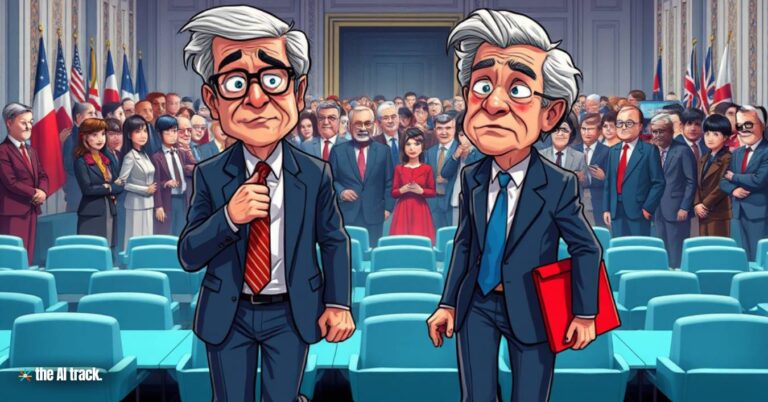Jump to Sections
Exploring OpenAI CEO Sam Altman’s Impactful Engagement with Congress
In a captivating dinner discussion, Sam Altman, CEO of OpenAI, delved into the world of artificial intelligence with approximately 60 lawmakers. This closed-door gathering provided a unique opportunity for Congress to gain valuable insights into the challenges and possibilities of AI. In this article, we dissect Sam Altman’s engagement with lawmakers, shedding light on how this interaction may influence the future of AI in government.

Sam Altman’s Dinner Discourse
On a recent evening, the halls of Capitol Hill resonated with discussions of artificial intelligence as lawmakers engaged with Sam Altman. The CEO of OpenAI took center stage, addressing a diverse group of legislators for nearly two hours.
Altman’s presentation covered a wide spectrum of AI-related topics, from the advanced technologies developed by his company to the intricate regulatory challenges that accompany AI’s rapid advancement. This comprehensive discussion served as a precursor to Altman’s scheduled testimony before the Senate Judiciary subcommittee on privacy and technology.
AI’s Peak Moment in Congress
The timing of Altman’s dinner discussion couldn’t have been more significant. It occurred during a period when AI has firmly captured the fascination of Congress. Concurrently, the Senate Homeland Security and Governmental Affairs Committee held a hearing on artificial intelligence in government.
The House Judiciary Subcommittee on Courts, Intellectual Property, and the Internet also scheduled a hearing centered on AI and copyright law (regarding the issue of copyrights, Japan has taken a bold step by affirming that it will not enforce copyrights on data used in AI training).
The fact that AI is commanding such attention underscores its growing impact on various aspects of government and society. It has become imperative for lawmakers to understand the implications of AI as they shape policies and regulations.
Lawmakers’ Perspectives
Approximately half a dozen lawmakers shared their thoughts on the dinner with CNBC. They described the conversation as broad-ranging and informative, touching on both the fears and opportunities associated with AI. Altman’s engaging presentation received high praise from several attendees.
Representative Ted Lieu, vice chair of the House Democratic Caucus, lauded Altman’s ability to keep members of Congress engaged throughout the discussion. He noted that it’s no small feat to captivate legislators for an extended period. Lieu, along with GOP Conference Vice Chair Mike Johnson, co-hosted the dinner and commended Altman for providing a wealth of information.
One highlight of the evening was Sam Altman’s live demonstration using ChatGPT, OpenAI’s generative AI chatbot. During the dinner, ChatGPT drafted a bill dedicating a post office to Lieu, followed by writing a speech for Johnson to deliver on the House floor. The practical demonstration left a strong impression on attendees.
Diverse Perspectives on AI
Representative Haley Stevens expressed her awe at the meeting, highlighting its uniqueness in her three-term congressional experience. She appreciated the organizers for bringing together a cross-section of Congress to engage in discussions about AI’s transformative potential.
Representative Anna Eshoo, co-chair of the Congressional AI Caucus, characterized Altman as “forthcoming” and commended the thoughtful nature of the conversation. Eshoo emphasized the importance of understanding AI comprehensively before making decisions that impact its future.
AI Impact
The discussions extended to various aspects of AI, including its role as a tool to assist humans rather than replace them in their jobs. There was a consensus that AI is here to perform tasks, not replace entire professions. This sober conversation helped lawmakers dispel some of the hype surrounding AI.
Nevertheless, there remain unanswered questions about AI’s capabilities, the extent of Congress’s role in regulating it, and OpenAI’s approach to transparency. One particular area of concern is OpenAI’s decision to be less forthcoming about the development of its latest large language model, GPT-4. Experts have critiqued this choice, citing both competitive advantages and safety concerns.
Regulating AI’s Precursors
Representative Jay Obernolte, who holds a graduate degree in artificial intelligence and is a member of the congressional AI caucus, discussed the potential regulation of AI precursors. Drawing an analogy with the regulation of raw materials for weapons, Obernolte proposed the idea of an international registry to track entities with the computing power required to create advanced AI.
AI as a Tool, Not a Creature
Representative Ro Khanna emphasized two fundamental points made by Sam Altman. Firstly, AI is a tool designed to assist, not replace, humans. Secondly, AI performs tasks rather than taking over jobs. This perspective is crucial in clarifying AI’s role in the workforce and dispelling misconceptions.
The Challenge of Open Source
The dinner discussion also touched upon the question of open-source AI models. While open-source models can foster innovation, there is a concern about the potential misuse of AI when it’s readily accessible. Striking the right balance between openness and safeguarding against misuse remains a challenge for the AI community.
Key Takeaway
Sam Altman’s dinner discussion with lawmakers showcased the growing importance of AI in congressional decision-making. It offered valuable insights into the challenges and possibilities of AI regulation, transparency, and its impact on various sectors. As AI continues to shape our world, these discussions pave the way for informed decisions in the realm of technology policy.






